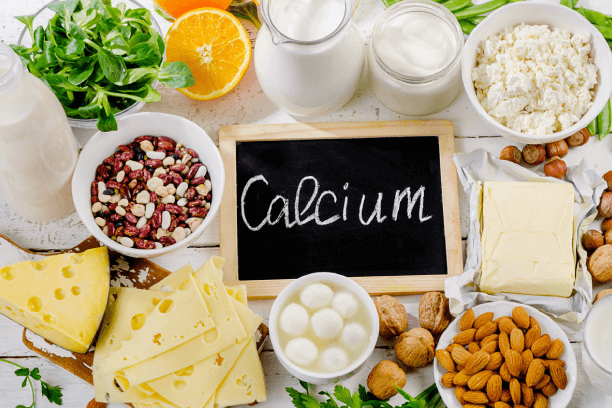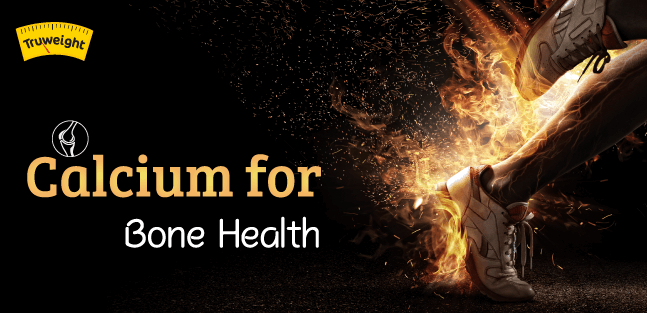Food & Nutrition, Health
Why Is Calcium Intake Important For Men And Women?
Calcium is a vital nutrient of our diet, but unfortunately, its importance is often overlooked. Almost every part of the body, be it the heart, nervous system or muscles, need calcium for proper functioning.
In fact, calcium is the building block for ensuring good bone health in both men and women. It is important to note that an insufficient amount of calcium in the body can lead to several health problems such as sleeping disorders, anxiety, depression, etc.
Table of Content
- Major health benefits of calcium
- The connection between calcium and osteoporosis
- The best source of calcium is food
- Pros and Cons of whole milk dairy
- Tips for increasing calcium dairy products
- Increasing calcium through non-dairy sources
- Other essential nutrients for healthy bones
Irrespective of the age or gender, calcium for bone health is essential for everyone.
For this reason, one should focus on limiting the intake of the food that leads to depletion of calcium and increases the intake of food that helps in absorbing calcium, such as magnesium and potassium-rich food.
Major health benefits of calcium
A major point to keep in mind is that calcium helps in ensuring healthy bones and teeth, making them strong even as the person grows.
Secondly, it helps in sending messages to all body parts through the nervous system. Thirdly, it helps in clotting of the blood. Fourthly, it supports the contraction of the muscles. Fifthly, it helps in regulating the rhythm of the heart.
It is important to note that if the person is not taking a sufficient amount of calcium, the body starts absorbing calcium from the bones leading to weakening of bones or osteoporosis. Deficiency of the calcium can also lead to mood problems like anxiety, irritability, difficulty in sleeping and depression.
In spite of its vital functions, there is a lot of confusion about calcium intake and how to protect the bones in the best possible way. People even have vague knowledge about how much calcium one should take and from where.
Moreover, there is also confusion about the relation of calcium with other nutrients such as potassium and magnesium. Such confusion clearly indicates that most of the people are not getting a sufficient amount of calcium needed by their bodies.
About one in two women and one in four men above 50 years are prone to breaking of the bones due to osteoporosis. Hence, calcium for both women and men is vital. Intake of sufficient amount of calcium is not only important for the older people.
Calcium is also important for children, especially in their growing age as bone mass keeps on building until the mid-20s. Irrespective of the age, one should take a sufficient amount of calcium requirements for taking care of the bones.
The connection between calcium and osteoporosis
Osteoporosis refers to a “silent” disease. Its characteristic feature is the loss of bone mass. Weak bones can lead to fractures and other health concerns. Usually, individuals who have osteoporosis have difficulty in recovery.
In fact, osteoporosis is the second most common reason for death among women generally above 60 years. Although the risk factor is present for men also, it is usually delayed by 5-10 years. Osteoporosis can, however, be easily prevented, and the very first step in this direction is getting the right amount of calcium.
The recommended amount of calcium intake for children between the age 0-6 months is 200 mg/day, between 6-12 months is 260 mg/day, between 1-3 years is 700 mg/day, between 4-8 years is 1,000 mg/day and between 9 to 18 years is 1,300 mg/day.
For adults between 19-50 years the recommended amount is 1,000 mg/day, between 51-70 years is 1,000 mg/day for males and 1,200 mg/day for females and above 71 years is 1,000 mg/day.
The best source of calcium is food
The doctors recommend that most of the calcium intake should be through food and a small amount of supplement can be taken to make up for any gap.
The body can absorb more amount of calcium from food than any other supplement. Moreover, it is revealed through studies those who take the maximum amount of calcium through food have stronger bones in comparison to those who are taking supplements.
Moreover, high doses of calcium supplement can invite the risk of heart disease and kidney stone. However, the benefits of calcium supplements can’t be denied.

Good sources of calcium
- Dairy products
- Green leafy vegetables
- Some fish
- Oatmeal, tofu
- Summer squash, cabbage
- Garlic
- Green beans
- Sea vegetables
- Other calcium-fortified foods like orange juice and
- Cereals are the best calcium food for bones
Pros & Cons of whole milk dairy as a source of calcium
Although milk and other dairy products are good sources of absorbable calcium food for healthy bones, yet it has many drawbacks.
The whole milk dairy product generally also contains high saturated fats. It is recommended by many health institutes to limit the intake of high saturated fats and opt for low fat or no-fat dairy products.
However, research has shown that whole milk results in low level of obesity and less amount of body fat. Moreover, in low-fat milk, there are lots of hidden sweets for compensating for the loss of taste, which can more adversely affect the health and weight of the person than the saturated fat.
Moreover, milk usually has a huge amount of estrogen. It has been revealed through some studies that there is a close link between milk and cancer of different types such as prostate, breast and testicular.
The reason for it in modern dairies, the cows are given a lot of hormones and antibiotics, so that they are continuously pregnant for getting milk for more than 300 days in a year. However, the fact is that higher level of pregnancy in cows means a higher level of hormones. Moreover, lactose intolerance is commonly seen in a lot of people.
Lactose intolerance refers to the inability to digest the lactose (sugar) found in milk and other dairy products. Its symptoms can be mild or severe, such as cramping, gas, bloating and diarrhoea. Besides, lactose intolerance also makes it difficult to absorb calcium from dairy products.
Tips for increasing calcium intake through dairy products
Calcium intake can be boosted by taking calcium-rich foods many times a day. The calcium-rich food can be added in the diet by:
- Using milk instead of water while preparing oats or other breakfast cereals.
- Substituting milk instead of liquid in some soups such as squash, tomato, pumpkin, etc.
- Adding milk to several sauces or using it as a base in sauces like Béchamel sauce and Alfredo.
- Preparing whole-wheat pancakes, waffles, etc. with milk or yoghurt.
- Getting creative with yoghurt by using it for making dressings or dips or putting it on potatoes instead of sour cream.
- Preparing fruit smoothies with milk or yoghurt. The blended smoothies can also be freeze for popsicles.
- Enjoying cheese as a dessert or snack. There are numerous varieties of cheese such as cheddar, Gouda, mozzarella, Parmesan, etc.
Ways To Increasing calcium through non-dairy sources
- It is quite easy to add greens in soups, salads and stir-fries. One can choose kale, turnip greens, collard greens, dandelion greens, beet greens, mustard greens, broccoli, and cabbage.
- More nutrients and calcium food for bones can be added by spicing up the dishes prepared from these with garlic, thyme, basil, oregano, and rosemary.
- One should have green leafy salads with meals. One can try romaine hearts, butter lettuce, mesclun, arugula, watercress and red leaf lettuce.
- Can add extra servings of highly nutritive veggies to meals, such as asparagus, broccoli, cabbage, fresh green peas, okra or bok choy.
- Salads and sandwiches can be prepared with canned fish like pink salmon or sardines.
- Beans and legumes must be included as an essential part of meals. They taste marvellous in stews, soup, or in main course meals.
- One can also try tofu, black-eyed peas, tempeh, black beans and dried beans. Edamame can also be consumed as a snack.
- The day should start with calcium-rich oats which can be prepared either sweet or salty. Its value can be enhanced by adding a pinch of cinnamon to it.
- Nuts and seeds like almonds or sesame seeds should be eaten as snacks. Even breakfast cereals can be added with these nuts. Moreover, sandwiches should be prepared with whole wheat bread.
Other essential nutrients for healthy bones
When it comes to bone health, only calcium is not sufficient and some other nutrients have to be taken to allow absorption of calcium. These nutrients and bone strength vitamins are as follows:
1. Magnesium:
Magnesium helps in absorption and retaining of calcium for building and strengthening the bones. Since magnesium is not stored in the body, it is essential to get it in enough amounts in the diet. An adult man needs 400-420 mg an adult woman needs 310-320 mg of magnesium daily.
The magnesium-rich food are nuts ( such as almonds and cashews), seeds (like pumpkin, flax, sesame, sunflower), seafood, whole grains, legumes, tofu, and several vegetables like spinach, Swiss chard, turnip, summer squash, broccoli and mustard greens, cucumbers, sea vegetables, and celery. One should lessen the amount of sugar and alcohol, which lead to a rise in the excretion of magnesium.
2. Vitamin D:
It helps in the absorption of calcium and its natural source is sunlight. In order to sufficiently absorb Vitamin D one should spend at least 15 minutes in the sun every day.
3. Phosphorous:
It also helps in the absorption of calcium, but its excess can be toxic. The sources of phosphorous are dairy, pork, poultry, fish (cod, tuna, and salmon), nuts, lentils and whole grains.
4. Vitamin K:
It helps the body in regulating calcium. It good sources are broccoli, dark green lettuce, Brussels sprouts, collard greens, and kale.
How to find out whether you are deficient in vitamin B12?
The first consultation is on us. Book your FREE CONSULTATION with a Possible Nutritionist!
